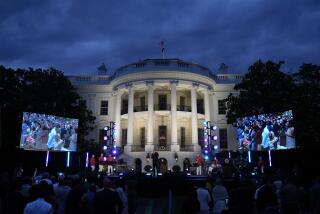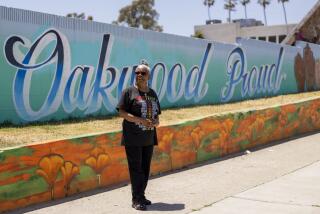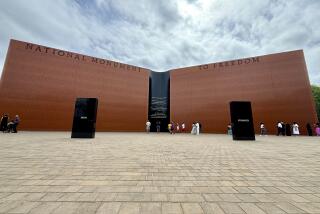A Tradition Revived
- Share via
People took it with them when they left.
On that journey from rural towns in Texas and Louisiana, this tradition was precious cargo, packed up with all the other valuables.
But Los Angeles of the late 1930s and 1940s was not the same as those rural towns. People here did not stop to remember the last enslaved Africans. People did not celebrate as if they were hearing the news for the first time. Nobody talked about the Union general.
Here Juneteenth--a precious Southwestern holiday--was ordinary, a diamond turned to glass.
“Come June 19th of 1949 I asked, ‘Why is everybody going to work? Why are the banks open?’ ” said Jonathan Leonard, 66, a Texas native who came to Los Angeles in 1948. “I couldn’t believe it.”
But year after year the Leonards and other families hosted celebrations to commemorate June 19, 1865, the day slaves in Texas and parts of surrounding states learned they were free.
“The memories of those migrants kept the celebration alive--even though it still wasn’t popular here,” said Rick Moss, history curator at the California African American Museum.
Decades later there are now major public celebrations throughout the city, including one today in Leimert Park organized by Leonard. The William Grant Still Community Arts Center is hosting a three-day celebration beginning Friday.
Generations and miles removed from its origin, Juneteenth has become a universal celebration, embraced by those who have no roots in Texas or Louisiana but have a deep need for the meaning the day offers.
“The notion of tradition is a powerful one,” said sociologist-poet Derrick Gilbert, also known as D-Knowledge. “What still so many black folks yearn for is a notion of history, a notion of lineage and not one that’s contrived in political arenas.”
The history of Juneteenth is rooted in Galveston, Texas. There enslaved Africans continued toiling in slavery 2 1/2 years after Abraham Lincoln signed the Emancipation Proclamation. But on June 19, 1865, Union Gen. Gordon Granger rode into Galveston with news that legal slavery had ended, Moss said.
In Texas, parts of Louisiana, Arkansas and Oklahoma the celebration grew into a grand affair, with huge community gatherings, barbecues and parades. But outside the region there were no such events.
“If you lived in California or on the East Coast, you didn’t know Juneteenth from any other teenth,” Moss said. “It was not until the migration of the ‘30s and ‘40s where you had large numbers of African Americans coming from those states that you began to hear more about those celebrations.”
According to the National Assn. of Juneteenth Lineage, an estimated 140 cities and towns across the United States and Canada now hold annual celebrations to commemorate African Americans’ “independence day.”
Los Angeles celebrations began last weekend with a program at the Gene Autry Museum featuring storyteller Leslie Perry.
“Tradition has it that we have to have barbecue ribs, red soda water, white bread” and watermelon, Leonard said. “Traditions are the foundation of great nations and communities.”
The celebration today in Leimert Park has the traditional menu, and Texan Willie Hardin is the barbecue chef.
At the Mt. Carmel Senior Citizen Center at 70th and Hoover streets, memories of tradition are as abundant as memories of the indignities suffered in the South. Many at the center left Southern states decades ago, searching for jobs and hope.
“We don’t consider California a land of promise, but it is better than what we had there,” said Bennie Lee Ford, 78.
At Macedonia Baptist Church in Watts, where Ford is a member, there is a Texas Club, and groups for migrants from other states.
“The club has allowed everybody from Texas to be aware of just how far we’ve come,” Ford said.
Mae Jackson remembers the Juneteenth stories. One was of a slave named Lonnie who learned of his freedom and stopped his work right on the spot. “Do it yourself, I’m free!” he told his master. “And rode off,” Jackson said with a laugh.
Katie Henry, 81, has no memories of celebrating June 19. “Ours was May 8,” she said.
That was the day enslaved Africans in Mississippi learned they were free.
For Henry, who was born in Meridian and grew up in Shuqualak, the notion of slavery is not some distant, nameless experience.
“My great-grandfather Mack Terry was freed when he was 12,” Henry said. “His father was born in Madagascar, Africa.”
But members of the younger generation, like Valerie Holton, had no memories of Juneteenth or any other such celebration.
In recent years Holton, the owner of Black L.A. Tours, began hearing about Juneteenth and wanted to learn more. She began taking tour buses to Allensworth State Park--the site of a historic all-black town in Tulare County--for a Juneteenth celebration.
“It seemed only appropriate to have that celebration in a black township,” said Holton, an official of Los Angeles Friends of Allensworth.
About 250 people attended the first Juneteenth celebration five years ago. Since then the number has grown to about 3,000, said Jo Ann Frierson, a state parks official and statewide coordinator for Friends of Allensworth.
Last year more than 300 people from Los Angeles packed into five buses headed to Allensworth, Holton said. Another group will go on Saturday.
Even on the 2 1/2-hour ride there, history lessons abound while travelers watch historic videos or listen to poets and other speakers such as a Tuskegee Airman or a Buffalo Soldier.
At Allensworth the day is spent touring homes, listening to docents dressed in period attire tell the history of the town built by former slaves and their descendants who prospered there. On two stages, one dedicated to youth, there are speakers and entertainment.
“There is a need to be where they can see the positive things about us,” Frierson said.
In Los Angeles, the William Grant Still Community Arts Center began holding a Juneteenth celebration in 1991, said Eric Thomas, who heads a support group for the center.
The celebration is “an opportunity for the black community to examine itself and refocus on what our best hopes and aspirations are,” Thomas said.
On Saturday the center’s celebration will feature poets, including Gilbert, a UCLA and Loyola Marymount sociologist.
“There needs to be more attachment to [Juneteenth]” and a real understanding of what is being celebrated, he said.
“We celebrate the struggle, the perseverance of people like Frederick Douglass, Sojourner Truth, Nat Turner, Denmark Vesey and the millions of slaves who sought their humanity,” Gilbert said.
In one of his college classes, students receive an unforgettable lesson about the Middle Passage, the cruel ocean voyage from Africa to the Western Hemisphere. In a hot, cramped room, sitting blindfolded on the floor, students listen to reflections about the Middle Passage and the millions of lives lost on the journey.
“It’s really emotional,” Gilbert said. “I have black, white, Latino, Asian students crying.” This kind of education is important for everyone, he said, because “these things are neglected, disrespected and basically lied about in our American so-called educational system.”
Likewise, many who celebrate Juneteenth say everyone can benefit from learning history.
“The more we discover about our history the more we discover what it is to be an American,” Moss said. “We have Anglos asking about Juneteenth. These things are being discussed and questions are being asked. We’ve operated in parallel worlds. They say, we know July 4, but not this Emancipation Day.”
(BEGIN TEXT OF INFOBOX / INFOGRAPHIC)
Area Celebrations
Juneteenth is being observed throughout California. Here are some local events:
Today
* Leimert Park, Crenshaw Boulevard and 43rd Street: Entertainment, speakers, food; noon; free.
* Baldwin Hills Crenshaw Plaza, Crenshaw and Martin Luther King Jr. boulevards: 10 a.m. to 6 p.m.; vendors include Mrs. Bethune’s Tea Cakes; exhibit by Black Inventions Museum.
Friday
* William Grant Still Community Arts Center: 2520 W. View St., three blocks east of La Brea Avenue, 7 p.m. reception.
Saturday
Allensworth State Park: Tulare County, daylong celebration; tours of historic homes, storytelling, speakers and entertainment, including Phyllis Battle and Al Eaton; exhibit on African Americans in the military; $3 per car, state park entrance fee; for more information, call Friends of Allensworth, Los Angeles chapter (213) 753-4764, or the state park: (805) 849-3433.
Hawthorne Plaza: “Down home blues and barbecue buffet” at Hawthorne and El Segundo boulevards; entertainment by Linda Hopkins, Harmonica Fats, Charlie Jene; 7-11 p.m.; center court of the mall; $50.
* William Still Community Arts Center: 2520 W. View St., three blocks east of La Brea Avenue; noon-6 p.m., youth and church choirs; poets D-Knowledge, Shari Randolph, Sunji Ali, Roni Walters; free.
Sunday
* William Grant Still Community Arts Center: noon-6 p.m., First African Methodist Episcopal drama department, Aunt Wannie’s Youth, Master Jam; free.
More to Read
Sign up for Essential California
The most important California stories and recommendations in your inbox every morning.
You may occasionally receive promotional content from the Los Angeles Times.










